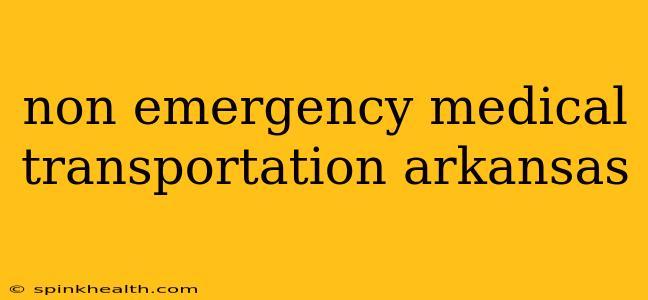Arkansas, like many states, faces the challenge of ensuring reliable and accessible Non-Emergency Medical Transportation (NEMT) for its residents. This isn't just about getting from point A to point B; it's about ensuring individuals can access crucial medical appointments, treatments, and therapies without undue hardship. This guide will help you navigate the NEMT landscape in Arkansas, addressing common questions and concerns.
What is Non-Emergency Medical Transportation (NEMT)?
NEMT is transportation for healthcare-related appointments that aren't emergencies. This could include dialysis treatments, chemotherapy sessions, doctor's visits, physical therapy appointments, and more. Think of it as the vital link connecting individuals with the healthcare they need. It’s often provided by private companies contracted by Medicaid, Medicare, or other insurance providers, but understanding how to access these services is key.
How Do I Find NEMT Services in Arkansas?
This is often the first hurdle. Finding the right NEMT provider can feel overwhelming. Your first step should be contacting your insurance provider. Medicare, Medicaid, and private insurers often have pre-approved NEMT networks. They will guide you to providers within their system who can service your needs and provide the necessary coverage. If you are uninsured or your insurance doesn't cover NEMT, you might need to explore options such as county health departments or local social service agencies. They can offer guidance on available resources and potentially connect you with charitable organizations or community programs providing assistance.
What Types of NEMT Services Are Available in Arkansas?
The availability of specific NEMT services can vary depending on your location and insurance coverage. However, commonly offered services include:
- Wheelchair-accessible vehicles: For individuals with mobility challenges.
- Ambulance services (non-emergency): For those requiring more specialized medical support during transport.
- Individual rides: Direct transportation from your home to your destination.
- Group transportation: Often used for patients attending the same appointment or facility.
What Documents Do I Need to Access NEMT Services?
The required documents will depend on your insurance provider and the specific NEMT company. Generally, you’ll need:
- Insurance information: Your insurance card and potentially pre-authorization numbers.
- Physician's referral: Many NEMT providers require a doctor's order specifying the need for transportation.
- Appointment details: The date, time, and location of your appointment.
- Personal information: Your name, address, and phone number.
How Much Does NEMT Cost in Arkansas?
The cost of NEMT varies widely depending on factors like distance, type of vehicle required, and insurance coverage. If your insurance covers NEMT, your out-of-pocket expense might be minimal or even nonexistent. However, if you lack insurance or your coverage is limited, you might have to pay for the service yourself. Investigating potential financial assistance programs is vital in such situations.
What if I Need NEMT on Short Notice?
Scheduling NEMT in advance is always recommended. However, emergencies can arise. If you need NEMT urgently, contact your insurance provider or the NEMT provider directly to explain your situation. They may be able to accommodate your request, though availability is not guaranteed, particularly on short notice.
What if I’m Unsatisfied with My NEMT Provider?
If you've had a negative experience with a NEMT provider, don't hesitate to lodge a complaint. Contact your insurance provider and report your issues. They have procedures for addressing complaints regarding the quality of care and service provided by their contracted NEMT providers.
Navigating NEMT in Arkansas requires planning and proactive communication. By understanding your options and utilizing the available resources, you can ensure access to reliable transportation for your healthcare needs. Remember, accessing vital healthcare shouldn’t be hindered by transportation challenges.

